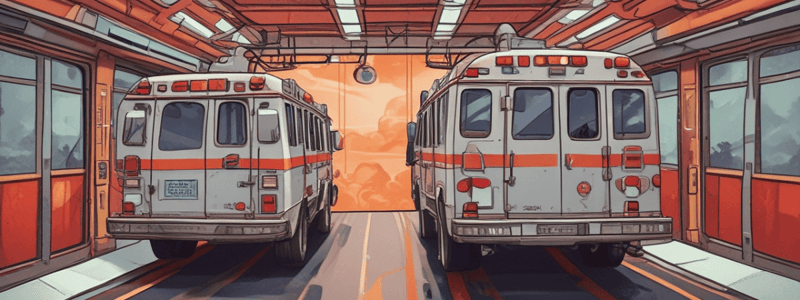Podcast
Questions and Answers
What is the primary difference between medical emergencies and traumatic injuries?
What is the primary difference between medical emergencies and traumatic injuries?
- Medical emergencies are caused by diseases, whereas traumatic injuries are caused by physical forces. (correct)
- Medical emergencies involve the respiratory system, whereas traumatic injuries involve the cardiovascular system.
- Medical emergencies involve the brain, whereas traumatic injuries involve the body.
- Medical emergencies involve the circulatory system, whereas traumatic injuries involve the respiratory system.
What type of emergency occurs when patients have trouble breathing or inadequate oxygen supply to tissues?
What type of emergency occurs when patients have trouble breathing or inadequate oxygen supply to tissues?
- Neurological emergency
- Respiratory emergency (correct)
- Gastrointestinal emergency
- Cardiovascular emergency
What is a common cause of Endocrine emergencies?
What is a common cause of Endocrine emergencies?
- Seizures or strokes
- Appendicitis or diverticulitis
- Cell disease or other blood clotting disorders
- Complications of diabetes (correct)
What is the primary focus of medical assessment?
What is the primary focus of medical assessment?
What is the primary goal of the medical size-up?
What is the primary goal of the medical size-up?
Which type of emergency involves the body's response to foreign substances, such as allergic reactions?
Which type of emergency involves the body's response to foreign substances, such as allergic reactions?
What is the primary purpose of the primary survey in a medical patient?
What is the primary purpose of the primary survey in a medical patient?
Which of the following types of patients should be considered in serious condition and in need of rapid transport?
Which of the following types of patients should be considered in serious condition and in need of rapid transport?
What is the OPQRST method used for in patient assessment?
What is the OPQRST method used for in patient assessment?
What is the purpose of the secondary survey in a medical patient?
What is the purpose of the secondary survey in a medical patient?
What is the primary consideration when deciding on a transportation destination for a medical patient?
What is the primary consideration when deciding on a transportation destination for a medical patient?
Who typically staff air transport units for medical patients?
Who typically staff air transport units for medical patients?
Flashcards are hidden until you start studying
Study Notes
- Medical emergencies involve illnesses or conditions caused by a disease, whereas traumatic injuries result from physical forces applied to the body.
- Respiratory emergencies occur when patients have trouble breathing or inadequate oxygen supply to tissues, and may be caused by diseases like asthma, empyema, and chronic bronchitis.
- Cardiovascular emergencies are caused by conditions affecting the circulatory system, such as myocardial infarction (heart attack) or heart failure.
- Neurological emergencies involve the brain and may be caused by seizures, strokes, or syncope (fainting episodes).
- Gastrointestinal emergencies include conditions like appendicitis, diverticulitis, and pancreatitis.
- Kidney stones are a common Urologic emergency.
- Endocrine emergencies are often caused by complications of diabetes.
- Blood-related emergencies may include cell disease or other blood clotting disorders.
- Immunologic emergencies involve the body's response to foreign substances, such as allergic reactions.
- Medical assessment focuses on the nature of illness, symptoms, and patient's Chief complaint, and should be performed in a methodical manner to avoid overlooking important information.
- The medical size-up involves ensuring scene safety, determining the number of patients needing assistance, and considering additional help if needed.
- The primary survey involves forming a general impression, determining the patient's level of Consciousness using the AVP scale, and identifying life threats by assessing AB cde's (airway, breathing, circulation, disability, exposure).
- Unresponsive patients may require Airway adjuncts and ventilatory assistance with a bag valve mask.
- Patients who should be considered in serious condition and in need of Rapid transport include those who are unresponsive, have altered mental status, Airway or breathing problems, or obvious circulation problems.
- History taking is crucial in medical patients, including investigating the Chief complaint, obtaining a sample history, and asking questions about signs, symptoms, allergies, medications, and medical history.
- The opqrst method is used to ask questions about the history of present illness.
- The secondary survey is designed to identify any signs or symptoms of illness or injury that were not found during the primary survey.
- A full body exam should be performed on unresponsive patients, and a limited or focused assessment based on the Chief complaint should be performed on responsive patients.
- A baseline set of vitals, including blood pressure, pulseox, and blood glucose level, should be obtained, and cardiac monitoring should be considered for patients with cardiac-related symptoms.
- Reassessment involves checking the patient, reviewing treatments, and ensuring that they are still effective.
- Medical emergencies often require treatment beyond what is available in the prehospital setting, and primary prehospital treatments often address symptoms rather than the underlying disease process.
- The administration of medications is limited for advanced EMTs and requires direct permission from medical control.
- Written protocols may allow the administration of certain medications without calling medical control.
- Scene time may be longer for medical patients than for trauma patients, as gathering information is crucial for transmitting to the emergency department.
- Critical patients require rapid transport, and the transportation decision should be based on the patient's primary survey.
- The two common methods of transport are ground or air transport units, with ground units staffed by Advanced life-saving providers and air units staffed by Critical Care nurses and paramedics.
- The destination of transport should be the closest hospital with an emergency department, unless the patient requires specialized care.
Studying That Suits You
Use AI to generate personalized quizzes and flashcards to suit your learning preferences.




